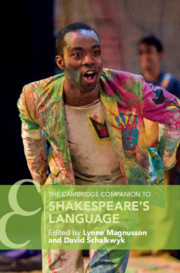
The Cambridge Companion to Shakespeare's Language
Sorozatcím: Cambridge Companions to Literature;
-
10% KEDVEZMÉNY?
- A kedvezmény csak az 'Értesítés a kedvenc témákról' hírlevelünk címzettjeinek rendeléseire érvényes.
- Kiadói listaár GBP 24.00
-
11 844 Ft (11 280 Ft + 5% áfa)
Az ár azért becsült, mert a rendelés pillanatában nem lehet pontosan tudni, hogy a beérkezéskor milyen lesz a forint árfolyama az adott termék eredeti devizájához képest. Ha a forint romlana, kissé többet, ha javulna, kissé kevesebbet kell majd fizetnie.
- Kedvezmény(ek) 10% (cc. 1 184 Ft off)
- Kedvezményes ár 10 660 Ft (10 152 Ft + 5% áfa)
Iratkozzon fel most és részesüljön kedvezőbb árainkból!
Feliratkozom
11 844 Ft

Beszerezhetőség
Becsült beszerzési idő: A Prosperónál jelenleg nincsen raktáron, de a kiadónál igen. Beszerzés kb. 3-5 hét..
A Prosperónál jelenleg nincsen raktáron.
Why don't you give exact delivery time?
A beszerzés időigényét az eddigi tapasztalatokra alapozva adjuk meg. Azért becsült, mert a terméket külföldről hozzuk be, így a kiadó kiszolgálásának pillanatnyi gyorsaságától is függ. A megadottnál gyorsabb és lassabb szállítás is elképzelhető, de mindent megteszünk, hogy Ön a lehető leghamarabb jusson hozzá a termékhez.
A termék adatai:
- Kiadó Cambridge University Press
- Megjelenés dátuma 2019. augusztus 8.
- ISBN 9781107583184
- Kötéstípus Puhakötés
- Terjedelem298 oldal
- Méret 227x153x15 mm
- Súly 500 g
- Nyelv angol
- Illusztrációk 2 b/w illus. 2 tables 0
Kategóriák
Rövid leírás:
Illuminates the pleasures and challenges of Shakespeare's complex language for today's students, teachers, actors and theatre-goers.
TöbbHosszú leírás:
The power of Shakespeare's complex language - his linguistic playfulness, poetic diction and dramatic dialogue - inspires and challenges students, teachers, actors and theatre-goers across the globe. It has iconic status and enormous resonance, even as language change and the distance of time render it more opaque and difficult. The Cambridge Companion to Shakespeare's Language provides important contexts for understanding Shakespeare's experiments with language and offers accessible approaches to engaging with it directly and pleasurably. Incorporating both practical analysis and exemplary readings of Shakespearean passages, it covers elements of style, metre, speech action and dialogue; examines the shaping contexts of rhetorical education and social language; test-drives newly available digital methodologies and technologies; and considers Shakespeare's language in relation to performance, translation and popular culture. The Companion explains the present state of understanding while identifying opportunities for fresh discovery, leaving students equipped to ask productive questions and try out innovative methods.
'Even though the volume is primarily intended for students of Shakespeare, it is no less suited for teachers, theatre professionals, and researchers who seek innovative ways to mine the richness of Shakespeare's language ... What admirably binds these essays together is their careful scrutiny of the vital work that language does - what Shakespeare does with language and what the language of Shakespeare's time does to him, and what we do with Shakespeare's language and what this language does to us, in turn.' Jelena Marelj, Renaissance et R&&&233;forme
Tartalomjegyzék:
Part I. Basic Elements: 1. Shakespeare and the problem of style Jeff Dolven; 2. Shakespeare's creativity with words Alysia Kolentsis; 3. The performative power of Shakespeare's language David Schalkwyk; 4. Verse and metre Oliver Morgan; 5. The dynamics of Shakespearean dialogue Lynne Magnusson; 6. Figures of speech at work Ruth Morse; Part II. Shaping Contexts: 7. Approaching Shakespeare through rhetoric Peter Mack; 8. Shakespeare and social languages James Siemon; Part III. New Technologies: 9. Digital approaches to Shakespeare's language Jonathan Hope; 10. Authorship, computers, and comparative style Hugh Craig; 11. Reading in time: cognitive dynamics and the literary experience of Shakespeare Amy Cook and Seth Frey; Part IV. Contemporary Sites for Language Change: 12. Writing for actors: language that cues performance Carol Chillington Rutter; 13. Language and translation Dirk Delabastita; 14. Popular culture and Shakespeare's language Douglas M. Lanier.
Több



